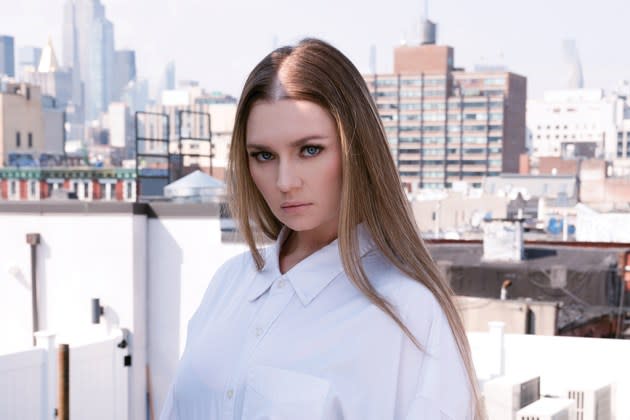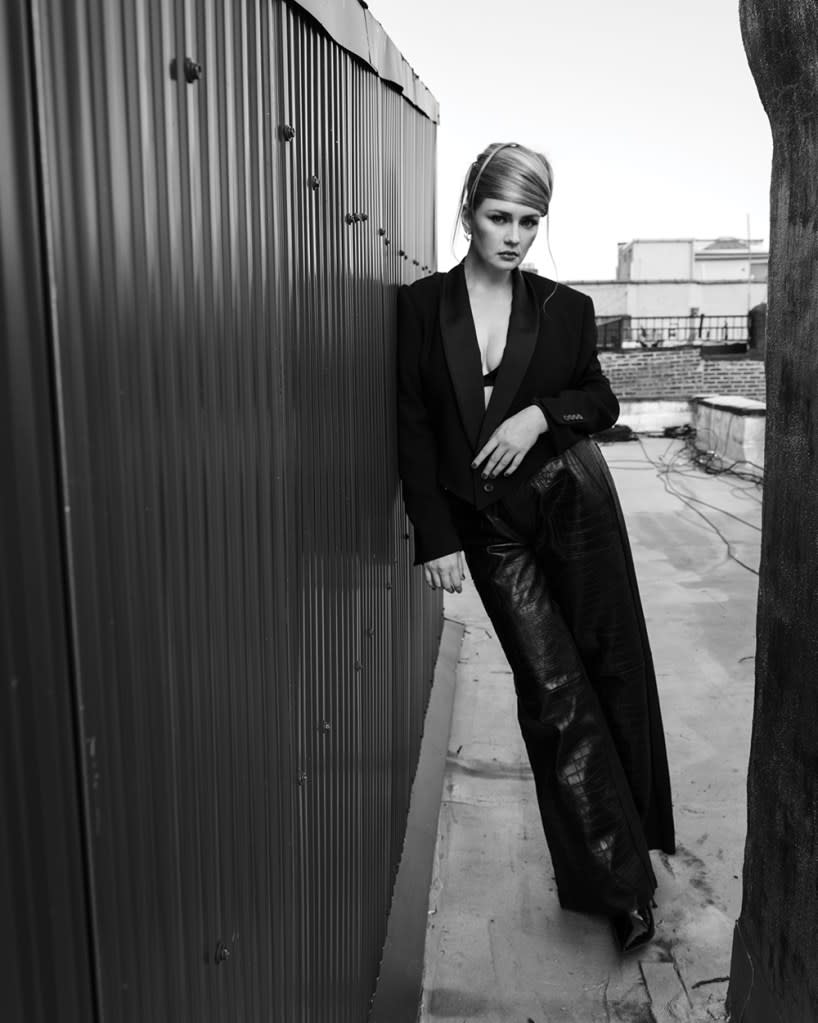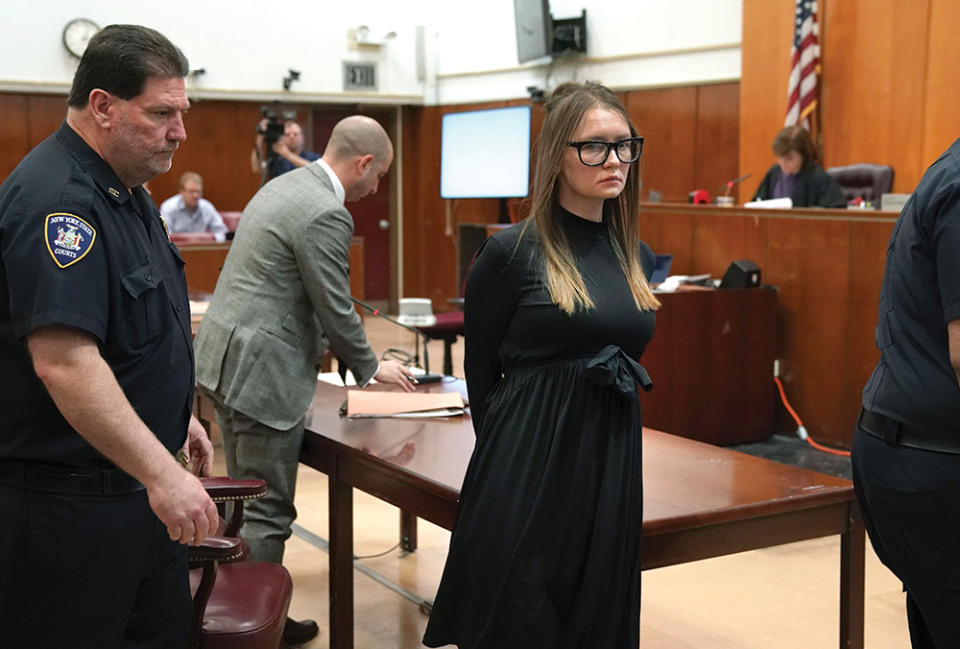Reinventing Anna Delvey: How House Arrest, Being Hated and Yearning for Freedom Is Changing the Scammer

It’s a scorching hot July day in Manhattan, but Anna Delvey wants to walk to her scheduled check-in with New York parole officers. All 40 blocks, that is.
Who can blame her? The infamous fake heiress, whose twisty tale of conning some of Wall Street’s biggest sharks became the inspiration for the hit Netflix series “Inventing Anna,” has been confined to a 470-square-foot apartment in the East Village for the past 10 months as she fights deportation to Germany, her most recent country of residence. Not surprisingly, she seizes the opportunity to be outdoors, her weekly Immigration and Customs Enforcement check-ins and trimonthly parole meet-ups providing her only escape. Wearing all black — a tight-fitting T-shirt, a bubble skirt and Roman sandals that obscure her ankle monitor — the notorious Russian swindler stands out from the sweaty masses rushing to their next air-conditioned stop.
More from Variety
Delvey isn’t perspiring and seems oblivious to the relentless sun as she walks slowly with pin-straight posture, happy to talk about books as though she is attending some kind of strolling salon. On this particular day, she’s reading “Gawker Slayer: The Professional and Personal Adventures of Famed Attorney Charles Harder,” written by the feared Hollywood super lawyer. “I never really cared much about the legal system as a whole until I got exposed to it myself,” she explains. “Winning a case can be an interesting logical exercise, very similar to solving a puzzle.”
Delvey is a controversial figure, and polarizing. She created the elaborate fake identity of a German scion, providing her entry into New York society. Her actual crimes involved fleecing a pair of financial institutions in her quest to create a Soho House-like club in downtown Manhattan and nearly got away with it. Some of her defenders, including “Inventing Anna” creator Shonda Rhimes, believe that the public has been particularly harsh on her because she’s a woman. In fact, Delvey follows in a long line of female felons who became New York tabloid obsessions (think Long Island Lolita Amy Fisher or Russian spy Anna Chapman) and thus caricatures. Men who tweak the truth, on the other hand, are often given passes. Regardless, spending time with Delvey is surreal.
A few people stare at the woman whose face was plastered across newsstands following her 2017 arrest, but nobody approaches. “It’s nice to be able to walk, but it would be nicer if I was, like, free,” she says.
Delvey could be free. She’s done her time after a jury found her guilty in 2019 of grand larceny in the second degree, attempted grand larceny and theft of services. But in 2021, she was detained by ICE for overstaying her visa and placed under house arrest the following year. Since then, she’s been waging a legal battle to remain in the United States — New York, specifically, where her crimes were committed. Simultaneously, she’s fighting to reclaim her narrative. She’s got a fledgling podcast and an in-the-works reality show that will chronicle her still-fabulous dinner parties. (Questlove already reached out to host one.) Everyone thinks they know Delvey, now 32, thanks to Julia Garner’s Emmy-nominated turn as a calculating criminal mastermind in “Inventing Anna.” But the real Delvey is hoping to challenge that perception.
“Was that the real me?” she asks about the person portrayed in the TV show. Delvey can’t say for sure because she hasn’t watched a single episode. But she catches the drift enough to note, “That wasn’t a docuseries; it was fiction. Before each episode it says, ‘It’s all true, except for whatever is made up.’ It’s not up to me to sit here and dissect Shonda Rhimes’ vision or interpretation. It is what it is.” Still, she’s quick to note that Garner put in the work, visiting her in prison. “She’s a very sweet person,” Delvey says. “She was just doing her job. I don’t really take it personally.”
In addition to the series, she has been the subject of the BBC Radio 4 podcast “Fake Heiress” and the stage play “Anna X,” starring Emma Corrin, among several other depictions. Few have faced an intense media glare while in their 20s like Delvey has. “There are all these preconceived notions, and that’s not good for my process.”
Three weeks earlier, I make the trek up the five flights to Delvey’s apartment, past the garbage cans in the lobby. It’s neither luxurious nor squalid — just a typical $4,000-a-month East Village apartment. Inside, there’s no air conditioning and it’s hot. A young man who looks like Timothée Chalamet sits in the corner of the living room. He introduces himself as Haskell and notes that he was named after cinematographer Haskell Wexler. I pick up a paperback of Bret Easton Ellis’ “American Psycho” from a mountain of books stacked neatly and am struck by the number of passages underlined. “It’s about the language. I like the way he uses long sentences,” Delvey says. On my laptop, I try to find an open Wi-Fi and notice someone in the building has named theirs “I_Hate_AnnaDelvey.” Delvey has grown comfortable with being hated. “I kind of learn to live with it. I feel like a lot of people just misunderstand what my intentions were.” She’ll get to those intentions in a bit.
After changing out of a black bathrobe and into a black blouse and parachute pants, Delvey suggests we take our conversation to the roof, where it’s cooler. She grabs a pair of Celine sunglasses, the kind Garner wears in “Inventing Anna,” heads up one flight of stairs and ignores the rooftop alarm she sets off by opening the door. Delvey props herself up on a ledge, intuitively dodging the discarded cigarette butts scattered about. I ask if Haskell is a boyfriend. “A friend. Not a boyfriend,” she says, noting that dating anyone right now would be “weird” due to “the power dynamics” of her confinement.

Instead, she’s keeping herself busy with the podcast — The Anna Delvey Show — which launched in June. Guests so far have included Paris Hilton (“She understands what it’s like to be a target”), oft-harassed journalist Taylor Lorenz and comedian Whitney Cummings. Podcast producer Sean Glass says he traveled in the same social circles as Delvey, and he paints her as part victim, part perp.
“When I started hearing stories about her case, I saw the other people mentioned, and I know a lot of those people and they’re really scammers,” says Glass. “Anna was trying to make things that were of substance, and she was doing it in ways that were messed up. But she wasn’t trying to snake oil anyone. There are people around her who are like full-on snake-oil salesmen.”
Born Anna Sorokina into a working-class family in Moscow in 1991, months before the collapse of the Soviet Union, the future socialite was exposed to the kinds of things that make it easy to blend into Manhattan’s upper-crust society. “What’s really big in Russia is, like, go to school, play tennis, take French classes,” she says of her youth. “We went to St. Petersburg to the Hermitage Museum. It was all very beautiful.”
I try speaking to Delvey in Russian, using phrases I learned as a kid from my mother, and she stares at me blankly. Clearly, she doesn’t comprehend what I’m saying.
“I personally have difficulties communicating [in Russian],” she half explains. “Like if I were to be surrounded with Russian-speaking people, after a week I guess I would just pick it back up. I feel like I’ve just lost it. Yeah, I just don’t use it at all anymore.”
Losing one’s native language seems atypical. Is Delvey actually Russian? Her accent, which Garner nailed, is hard to place. She pronounces “dozen” as “dose-en,” and her voice betrays a hodgepodge of geographic influences.
By her own account, she moved with her father from Russia to Germany right before she turned 15. Her mother and younger brother joined them a year later. From there, she headed to Paris to intern at the fashion magazine Purple and became obsessed with couture.
She transferred to Purple’s New York bureau in 2013 at the age of 21 and quickly fell in with New York’s 1% crowd. Over the next four years, she lived the high life, presenting herself as a wealthy European heiress. And someone rich often picked up the tab. But Delvey took the con too far when her plan to create the private club and art foundation began to coalesce. She needed capital to lease the six-story Church Missions House in Gramercy Park and created fake bank statements to secure a $22 million loan, temporarily fooling financial heavyweights like City National Bank and Fortress Investment Group in the process.
“I just wanted to have this building,” she says. “In an ideal world, I would have opened multiple locations, and I would have gotten one artist to change the whole space on a rotating basis every three to six months. Because you go to Soho House and nothing changes. It would have been an immersive experience: Just pick an artist and give them a platform to create this experience for members.”
She says it was a viable plan. According to her logic, the fact that she pulled one over on some banking-world titans is a testament to the plan’s strength.
“Nobody just gives you like $30 million,” Delvey says. “It all would have been paid off on a monthly basis.” She adds, “I would have never even gotten the money myself. That was never even on the table. It would have been like, ‘Oh, we did this renovation,’ and then they would invoice the bank. It was not me trying to steal people’s money for myself. But, yeah, I guess it’s all about a story.”
As authorities closed in on her scheme, they needed a friend to flip on her. In Delvey’s case, that was Vanity Fair photo editor Rachel DeLoache Williams.
“My ‘friend.’ Not a friend,” she says of Williams, who claims Delvey defrauded her of $62,000 when Williams was left to pay for a pricey trip to Marrakesh. (A jury acquitted Delvey of that charge.) “The prosecution used her as a human face because she was the only private person in my criminal case. Everybody else was banks and businesses, and nobody cares [about them]. The prosecution realized they’re gonna get much more sympathy if there’s, like, a girl, and they told her to cry. She said I’m the worst thing that ever happened to her. We’re just rolling our eyes.”
Williams wrote about her experience with Delvey for Vanity Fair and turned that piece into the 2019 book “My Friend Anna: The True Story of a Fake Heiress.” Lena Dunham optioned the book, but its development lagged, and the “Girls” creator let the option lapse. Last year, Williams sued Netflix over her portrayal by actress Katie Lowes in “Inventing Anna” and has complained that Delvey profited from the Rhimes series. (Delvey was paid $320,000 for the rights to her story, though much of that sum was used to pay back her victims, her lawyers say.)

“She’s made almost a million dollars [off of my story],” Delvey continues. “I’m not sure what happened with that [Dunham project]. I guess Lena did not want to compete with Shonda. And I’ve heard from a friend of a friend that Lena met with Rachel and said Rachel was boring.” (“Her claim that Rachel made $1 million from her dreadful experience is wrong,” says Williams’ attorney, Alexander Rufus-Isaacs. “The real number is $400,000.”) Dunham declined comment.
As Delvey chronicles the details of her comeuppance, she points to the significance of her one and only tattoo, a bow on her wrist that was inked in Berlin when she was 19. It was done as “an homage to Marie Antoinette,” but perhaps foreshadowed her fate as a woman just getting accustomed to the gilded life before facing the guillotine.
“She was a scapegoat,” Delvey says.
Julia Fox says Delvey, too, is something of a scapegoat for New York’s bloated gentry. The “Uncut Gems” actress, who famously dated Kanye West last year following his split from Kim Kardashian, has known Delvey since before her arrest and remains part of her circle of friends.
“The way that she’s being treated is just really unfortunate,” Fox says, “because then you see all these people getting away with similar things in broad daylight. What message is that sending? If she were a man, she would be a billionaire right now and no one would have questioned it.”
Fox has little patience for the finger-wagging at Delvey. “She would have been successful, and I do think that the quote-unquote scamming would have stopped,” Fox adds. “She did what all these rich guys do. They don’t use their own money for any projects they do — it’s all borrowed. And that’s what she was just trying to do. Oh, did she have to falsify some documents? Yeah. But so do those fucking guys.”
With Williams’ help, Delvey was arrested on Oct. 3, 2017, setting off a news-cycle tsunami. New York magazine’s Jessica Pressler scored the first interview with an incarcerated Delvey, and her subsequent feature served as the basis for “Inventing Anna.” After being convicted and sentenced to four to 12 years in prison, Delvey was released in 2021, only to become ensnared by ICE over immigration violations less than two months later. Her fate could be resolved tomorrow or years from now. There’s no timeline when it comes to ICE.
In the meantime, she can’t leave her apartment, prompting her to get creative with her pursuits. For the podcast, she initially had to use a specific VPN that restricts detainees’ internet use and keeps them from accessing things like porn. Sometimes the connection conked out mid-podcast. Then there’s the dinner-party show, which has already banked episodes with Cynthia Rowley and Timo Weiland. Elon Musk would be a dream attendee, she says. Just don’t call it a reality show even though Wheelhouse Entertainment’s Brent Montgomery (“Pawn Stars”) is producing. (She was working with reality powerhouse Bunim/ Murray on another one of her apartment-set docuseries.)
“I was really adamant about not including the ‘reality show’ label. It’s never used in a good way, right? It’s always like, ‘Oh, this shallow superficial person …,’” she laments. “It’s also hard to like sit down at dinner when two or three are having a conversation. It’s hard to capture that on camera. But I have a great team working on that.”
She’s also planning a documentary that uses footage from cameras installed in the apartment. Delvey’s idea is more performance art than “Big Brother” knockoff. “Like a time-lapse,” she says. “Just to communicate the monotony of what it’s like to be in the same space for extended periods of time.”
The sun sinks in the sky as dusk approaches. We head back down to Delvey’s apartment, where I say my goodbyes to Haskell, who has been waiting in the same chair during her two-hour absence on the roof. It turns out Haskell is Chalamet’s first cousin — a fact Delvey notes when I mention the resemblance. Because it sounds like a line, I confirm it by Googling Haskell’s full name while Delvey busies herself finding a pair of flip-flops. Haskell’s father is director Rodman Flender, a Roger Corman acolyte who went on to direct for such series as “The Office” and “Gilmore Girls.” Delvey seems uninterested in the Chalamet connection or my suggestion of trying to get the Oscar-nominated actor to appear on her podcast.
“I honestly have nothing to talk about with actors. I wouldn’t know what to talk about. We don’t have any shared experiences,” she says, pausing while she collects her thoughts. “I think I like talking to journalists.” (Tellingly, she counts Pressler as a friend who has visited the apartment socially.)
Still, one final question needs to be asked: Does Delvey regret the con?
“I regret a lot of decisions I’ve made in the past. I have not made great choices,” she says. “My mistakes are very public, and I will have to live with it forever.”
If she’s tired of being confined within these same East Village walls, she’s even more weary of being boxed in by her past. “It gets thrown back into my face every day pretty much,” Delvey says, her affect flat. “Me moving on does not mean that I’m saying everything I did was so right. I learned from my mistakes. I paid restitution in full. I paid my legal fees. I never had any public defender. I never took money from the government. Nobody’s paying my rent. Nobody’s paying for anything. So, people, what else is there?”
After spending the better part of two days with Delvey and texting with her for weeks after, I’m struck by her poise and intelligence — qualities that could be used for good rather than grifts. As she circles back to Charles Harder, noting her fascination with his high-profile First Amendment and defamation cases, it occurs to me that she’d make a great lawyer. I ask if she’s ever considered it.
“Hmm, I’m kind of a felon,” she says. “Not sure felons can be admitted to the bar.”
Styling: Altorrin and Sionán Murtagh/The Wall Group; Hair: Lurissa Ingrid/The Wall Group; Makeup: Gabriel Barse; Look 1 (White shirt with Denim Skirt): Shirt: R13; Skirt: C Plus Series; Look 2 (Blazer): ASOS; Pants: Teddy Vonranson; Shoes: BY FAR; Earrings: Alexis Bittar
Best of Variety
Sign up for Variety’s Newsletter. For the latest news, follow us on Facebook, Twitter, and Instagram.

 Yahoo News
Yahoo News 
